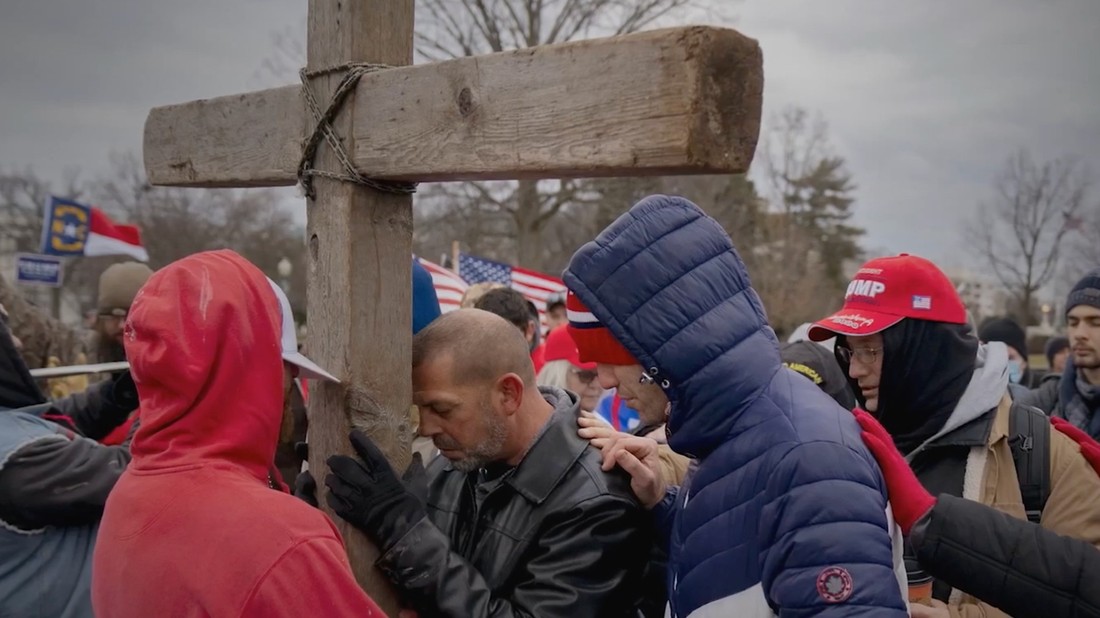There are two vital questions that need to be answered in the debate around Christian nationalism. First, is it a problem? Second, how concerned should we be? The answers given by the documentary God and Country (co-produced by actor-director Rob Reiner) are “Yes” and “Very.”
The heightened tone of the film reveals that the filmmakers are very worried, but they are more concerned with creating a vague sense of fear than in helping us understand the problem. The movie starts with the classic “Where were you when…” for the January 6 riot at the U.S. Capitol. This event was undoubtedly violent, and director Dan Partland (Unfit: The Psychology of Donald Trump) includes scenes intended to shock in this visual medium. We hear from various pundits on their first reaction to the melee, and the camera zooms in on Christians flags and Bible verses. Doug Pagitt, pastor and self-proclaimed “leading voice for progressive Christianity,” claims that “Christian nationalists were the primary organizers of the attack on the United States Capitol,” although to what extent it was organized is unclear. We don’t learn much in the documentary about who the organizers were or how they operated.
If you hit play on this documentary confused as to what Christian nationalism actually is, you will arrive at the closing credits more so. We get as many definitions of the phenomenon as there are pundits to share their opinions. Indeed, much of the energy in the film is taken up trying to define it. Journalist Katharine Stewart says that “Christian nationalism is the idea that America was founded as a so-called Christian nation and that our laws should be based on the Bible.” In a clip, congresswoman and provocateur Marjorie Taylor Greene says that Christian nationalism simply means “We’re proud of our faith.” One can easily grasp why Greene would have an incentive to muddy the definitional waters, but I expected the filmmakers to find a through-line to help us focus the conversation at the very least. What exactly should we be worried about?
Further additions add little light. Stressing the demographics of proponents, historian Kristen Kobes Du Mez says that Christian nationalism is “an identity linked to who Americans are and who they believe Americans ought to be,” a characterization that could be used for any political movement in U.S. history. If that wasn’t crystal clear, Rob Boston, of Christians for the Separation of Church and State, elucidates: Christian nationalism is “an agenda that seeks to change American society through politics,” another apt description of every political movement in America. David French adds that “Christian nationalism is a deeply felt emotional connection between the fate of the nation and the fate of the church,” which merely implies that a certain group of people have two deeply held identities that they believe are compatible. Phil Vischer, of VeggieTales fame, defines Christian nationalism as “the belief that America has a special God-ordained role in human history. … If I have decided that America is irreplaceable in God’s story, has a role to play that only America can play in God’s story and democracy gets in the way, then democracy has to go.”
To summarize, Christian nationalism is an idea, an identity, and a deeply felt emotion. Thus we are left with some vague mental associations of Christian nationalism but, again, no clear and consistent definition.
The examples provided above highlight the sloppiness of this attempt at an argument to prove the threat posed by Christian nationalism. One expert cites a survey that found that, after the January 6 riot, only 50% of “ambassadors and accommodators of Christian nationalism say that those who engaged in the [January 6] riot should be prosecuted.” He delivers the line in a particularly ominous tone, but we’re given no information about who these so-called ambassadors and accommodators of Christian nationalism are, how many of them there are, and how exactly they qualify to be counted in the group.
The film also claims in a “dark money”–style segment that over a billion dollars is funneled annually into Christian nationalist groups. The list they give includes the Heritage Foundation and Hillsdale College. To clarify, Heritage’s stated mission is “to formulate and promote public policies based on the principles of free enterprise, limited government, individual freedom, traditional American values, and a strong national defense,” which is hardly an authoritarian or even explicitly Christian mission. You don’t have to agree with every syllable to grasp the emphasis on freedom and limited government. And Hillsdale’s mission statement highlights the importance of “civil and religious liberty” in its first sentence. The organizations the filmmakers call out that may, in fact, support some form of Christian nationalism are the smallest and least well known.
In a needed breath of fresh air, Russell Moore of Christianity Today consistently makes helpful distinctions between what he means by Christian nationalism and other political philosophies. He explains that “Christian nationalism uses Christianity as a means to an end, that end being some form of authoritarianism. If there’s a religious basis for one’s authority, one is able to say, ‘You’re not just wrong; you’re on the wrong side of God.’” Moore strongly defends patriotism in contrast to this ideology, describing patriotism as a form of gratitude. By Moore’s lights, however, Christian nationalism is simply authoritarianism with a thin veneer of Christianity.
But Moore’s framing of the issue clashes with the hard turn the film takes. From a creative perspective, the documentary leaves much to be desired. Ten minutes before the end, it abruptly shifts to the abortion debate and the overturning of Roe v. Wade. We don’t have a compelling story to link the segments. The late-in-film move to the issue of abortion not-so-subtly associates all forms of religious conservatism with Christian nationalism.
And maybe that’s the point.
A rejection of Christian nationalism is only the starting point for the filmmakers, who would love it if viewers rejected mainstream conservative ideals, too, replacing them with progressive values. Their alternative to Christian nationalism is boilerplate progressivism with a splash of Christianity. This introduces precisely the same problems Christian nationalism suffers from—it’s a political ideology superficially baptized with Christian-sounding language. One interviewee at a rally summarizes Christianity as “God is in me and God is in you and we need to work together and really fight for a better life for everybody.” A nun who is interviewed says she used to be pro-life, but after seeing more examples of women in hardship, she is much more “nuanced” in her views on legal abortion.
Defined broadly, Christian nationalism is mostly benign and could describe the views of a wide swath of the population. Defined narrowly, it is an authoritarian movement with followers in the hundreds. Either way, the threat to democracy is not as dire as this film would have us believe. Assuming that the goals of this documentary were to create vague fears about conservative Christians, it succeeds. But if you’re looking for clarity or insight into the phenomenon of Christian nationalism itself, turn elsewhere.
One quote toward the end of the film caused me to reflect on the disconnect between this film and what actual conservative Christians are thinking about. One pastor asks, intending to be provocative, “Will we take all the hundreds of millions of dollars raised to end abortion, will we now take that same amount of resources and marshal them to help women who are facing unwanted pregnancies?” But that is already happening. Pregnancy-care centers and countless Christian human-service providers are actively investing in this area—and have been for decades. The gap between protesters on the floor of the Capitol building and the average religious conservative is wide.
Contrary to what the film would have you believe, religious and moral values have a vital part to play in the discourse of an open society. In my review in these pages of Robert Wuthnow’s insightful book Why Religion Is Good for American Democracy, I noted that “religion has provided, not a moral majority, but innumerable moral minorities that uphold free expression and a vibrant culture of dissent.” We will have disagreements about the nature of moral principles and how to apply them, but that doesn’t discount the necessity of incorporating moral values into our laws. The love of country that so many Americans espouse is rooted in part in the ability to express deeply held values through a free representational process. Instead of a disdain for religious observers, we should invite their active participation in the public sphere.

